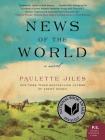|
|
 Jen Jen |
|

|
 |
Homegoing
Yaa Gyasi
This is a beautifully written historical novel about two sisters, unknown to each other, with very different lives despite living in the same castle. One lives upstairs in comfort, the other in the dungeons with the slaves. The narrative follows the sister’s descendants from Africa to America through eight generations. Themes of family, loyalty, slavery, and societal norms run through the book. I'm looking forward to discussing it with the Sister Wolf Book Group on August 2nd.
Listen to Yaa Gyasi discuss the book.
|
| |
|
 |
|
Al Franken, Giant of the Senate
Al Franken
I'm listening to Al Franken's memoir, Al Franken, Giant of the Senate, on libro.fm. Franken reads the book himself and I'm really enjoying it. The book is organized chronologically, from Franken's comedy career to his political career. While there's a lot of humor in the book, mostly at Franken's own expense, there also are topics, such as addiction of those in the inner circle of Franken’s life, that I didn't expect. It seems almost laughable, given the current news, that Franken was once frowned on for his colorful use of language. |
| |
|
 |
|
  Vinegar Girl, Anne Tyler Vinegar Girl, Anne Tyler
Hag-seed, Margaret Atwood
Gap of Time, Jeanette Winterson
The Sort-of-Shakespeare book group has met twice and both times had delightful discussions of books from Hogarth's Shakespeare retellings series (Vinegar Girl and Hag-Seed.) In August, we'll discuss The Gap of Time by Jeanette Winterson, a retelling of The Winter's Tale. I'm looking forward to another good read and discussion!
|
| |
|
|
|
|
|
|
|
 Sally Sally |
|
 |
|
|
|
|
| |
 |
|
Glass Houses
Louise Penny
A number of years ago, one of our customers introduced me to the excellent mysteries of Louise Penny, Her main character is Armand Gamache of the Suerete’ du Que’bec, and many of the books are located in the fictional village of Three Pines. I fell in love with Gamache with the first book I read! I suggest reading them in order; the 13th book in the series will be released on August 29.
In this latest book, Glass Houses, Gamache is now the Chief Superintendent of the Suerete’ du Que’bec, While he is home in Three Pines on a cold November day, a mysterious figure appears in the village. Gamache and his fellow villagers are first curious, then concerned. Who is the figure? Why is it in Three Pines? What can—or should—be done? Eventually, the figure vanishes but a body is discovered.
As in all of Penny’s books, the mystery is interesting, but the characters are compelling, creating a gripping read. In this story, Penny, Gamache, and the reader enter the court of conscience.
I don’t want to give away the story, so I won’t say more, except this: if you’re looking for a literary, character driven mystery, this series is for you. And begin with the first, Still Life.
|
| |
|
 |
|
News of the World
News of the World by Paulette Jiles
News of the World is set in Texas shortly after the Civil War, a time when the state was incredibly lawless. Captain Jefferson Kidd, a seventy-one year old veteran of two wars, makes his living travelling from small town to small town, reading the news of the world to townspeople eager both for entertainment and to learn what’s going on outside their small community.
The plot of the book is simple: Kidd is asked to take a 10 year old girl to the San Antonio area, a journey of about 400 miles through dangerous territory. The girl, Johanna, was kidnapped by the Kiowa four years earlier, after they killed her parents and baby sister in a raid. The Army has bought the girl back from her captors for some silverware and blankets, and wants her returned to her closest living relatives, an aunt and uncle who have sent a fifty-dollar gold piece for whoever will bring them the child. The Captain uses part of the money to buy a wagon, and he and Johanna set off on their journey.
The plot may be simple, but the trip is full of difficulties. During the four years since her kidnapping, Johanna has forgotten the English language, and all the trappings of her former life. She desperately wants to return to her Kiowa family, and has tried to run away several times before being put into Kidd’s care. The women at a local brothel bathe Johanna for Kidd, discarding her Kiowa clothes and giving her an uncomfortable dress and shoes which pinch her feet. Re-adjusting to such clothing is just the first of the cultural differences which Johanna faces. At one point, Kidd stops her from scalping someone, saying “it’s not done. . . .It is considered very impolite.”
Other people help Kidd with Johanna as the two make their way toward San Antonio, but the focus of the book is on the two of them, their growing relationship, and the difficulties they encounter along the way. Kidd is an uncommonly decent man, acting on his belief that “it was the duty of men . . . to protect children.”
An interesting note from the author at the end of the book comments on the psychology of children captured and adopted by Native American tribes on the frontier. Jiles clearly did research on this, which is reflected in the way Johanna is portrayed.
News of the World gives a fascinating glimpse into life on the frontier, and tells a great story of a journey by two unlikely companions.
Note: this review appeared in the Park Rapids Enterprise on July 29, 2017.
Hear Paulette Jiles talk about News of the World. |
| |
|
 |
|
Hillbilly Elegy
J.D. Vance
I’ve been listening to the audio version of Hillbilly Elegy from libro.fm. I’m not going to review the book (see Ann’s review below) but I do want to tell you that I’ve experienced first-hand what great customer service libro.fm provides. Recently, my phone died and I lost everything—contacts, pictures, apps—including the libro.fm app. When I got back my repaired phone, I began rebuilding my contact list and re-installing my apps. I made a mistake with the libro.fm app, and emailed them for help. A quick exchange of emails, and I was back in business, and very impressed with how quickly my problem was addressed. And it was done in such a way that I didn’t feel dumb! |
| |
|
|
|
|
|
|
|
| |
|
|
|
|

Ann
|
|
 |
|
Hillbilly Elegy
J.D. Vance
Hillbilly Elegy is J.D. Vance's memoir and so much more. The story begins in the impoverished Appalachian region of Kentucky. The family, including Vance's mother, sister, and grandparents, moves to the industrial "rust belt" of Ohio, in search of a better life. Vance's childhood is one of dysfunction and instability including alcoholism, abuse, and poverty. His grandparents and sister provide a degree of security and safety which helps to get him through. Vance beats the odds as he achieves success as a Marine and graduates from Yale Law School. Hillbilly Elegy is a memoir, but leaves much to reflect on regarding the long and short term effects of adverse childhood experiences in general and the struggles of families in poverty. It is an honest account which will leave readers with much to think about and book groups with much to discuss.
Here's an interview with J.D. Vance, the author of Hillbilly Elegy. |
| |
|
|
|
|
|
|
|

Gail |
|
 |
|
|
|
|
| |

|
|
32 Yolks: From my Mother's Table to Working the Line
Eric Rippert
Eric Rippert is chef and co-owner of the New York restaurant LeBernadin. He was born in France and this is his story of overcoming a sad growing up. Food was his pleasure so he entered the tough life of working his way up to becoming a chef. There seems to be a lot of books out now about chefs and cooking so I thought I'd try one. I was pleasantly surprised. Eric is not only a chef but has his own TV series. He also has written five cookbooks. This was an entertaining and inspirational book about a young Frenchman who ends up with a 3-star restaurant. I think there will be a sequel. |
|
|
 |
|
America the Anxious: How our Pursuit of Happiness is Creating a Nation of Nervous Wrecks
Ruth Whippman
The pursuit of happiness has become a billion dollar industry triggered by the best-seller "The Happiness Project" by Gretchen Rubin. Author Whippman takes on industry, family life, religion and even facebook. She says that finding happiness is not by looking inward to oneself but looking outward to others. With lots of humor and common sense this book gives you a different view of finding happiness in America.
Note: the paperback will be out in October. |
| |
|
 |
|
The Mermaid Chair
Sue Monk Kidd
Jessie Sullivan is called home to take care of her mother on Egret Island. Suddenly her ordinary life is turned upside down when she meets Brother Thomas, a monk who is about to take his final vows. There is a mysterious chair in the abbey that Jessie's mother says has special powers, or is it just a myth?
The author has won national acclaim with her books The Secret Life of Bees and The Invention of Wings. An enjoyable read for summer at the lake. |
| |
|
 |
|
Antiques Maul: A Trash ‘n’ Treasure Mystery
Barbara Allan
Brandy's mother lost her bid to be director of the local theater. Fearing her mother would go into a deep depression, she suggests they rent a booth at the antique mall to sell antiques and collectibles. When they check on their booth they discover a body! The title intrigued me as I love to watch Antique Road Show. Barbara Allan is actually a husband-wife team of writers. They live in Iowa in a house filled with trash and treasures. Each chapter closes with hints for antique buyers and sellers. The story is a light-hearted mystery filled with humor. |
| |
|
|
|
|
|
|
|

Hannah |
|
 |
|
|
|
|
| |

|
|
One L
Scott Turow
Turow wrote this non-fiction book after his first year in Harvard Law School and it's been in print ever since. His first novels couldn't find a publisher, so he determined to try the law. He found being a first year law student (1L) traumatic, exhilarating, exhausting, fascinating, and boring. He kept a journal, and wrote about his experience in a way that has terrified and encouraged many incoming law students. It also launched Turow as an author, because the book manages to pull in and beguile those of us who have no intention of studying law.
|
| |
|

|
|
Presumed Innocent
Scott Turow
This book cemented Turow as a best selling novelist. It was written on trains as he commuted to his job as a prosecuting attorney in Chicago. He learned from One L that it's dangerous to write about a real place in a way that allows characters to recognize themselves, even if you change their names. He therefore invented Kindle County, a place that's sort of a cross between Chicago and Milwaukee and some other Midwestern city. He's written exciting novel after novel set in this place that's so real he has a physical map he consults as needed. The plot twists are sure to surprise you, but it's his characters that are my favorite part of his writing.
|
| |
|
 |
|
Testimony
Scott Turow
And now Turow's latest novel! Successful attorney Bill ten Boom is 50, he's divorced, his sons are settled adults, and he feels restless. He leaves Kindle County to prosecute a case in The Hague. The book opens with the testimony of a Roma (aka, offensively, "Gypsy") man describing the massacre of 400 of his friends and family. One of the judges seems to indicate a bias toward Americans as the perpetrators. Furrow spent time in the Netherlands and Bosnia researching this book, so the reader gets a feel for these locations. Note: the book is not based on an actual incident, Turrow made it up.
Here's a PBS interview with Scott Turrow about the book.
|
| |
|
|
|
|
|
| |
|
|
|
|

Pam |
|

|
|
Esther
Rebecca Kanner
Kanner has given the classic Bible story of Esther a literary face lift. One of my favorite parts is the interaction with one of the king's soldiers during the year long period of beauty treatments. Esther puts her life on the line as she tries to save her people. This book drew me into the world of the king's court and the treachery encased in the beautiful palace.
|
| |
|
|
|
|
|
| |
|
|
|
|

Tim |
|
 |
|
Midnight in St. Petersburg
Vanora Rennet
Recently, the novels I've been reading all seem to have be set in the war years, and maybe a little after, 1937–1947. A rich mine of human drama and history; but perhaps I have been spending too much time there. You see, I found myself at the grocery, thinking a little too seriously about food rationing, while shopping for dinner, although my diet may have skewed my thinking just a bit.
Vanora Rennet's Midnight in St. Petersburg, swept me back to pre-revolution Russia, a welcome change of period and place. Rennet's gift of description has you feeling the cold of Petersburg's winter streets at dusk, just as she's able to wrench your heart with the anguish of passionate attachment and loyalty. All true, but I found myself recognizing the common thread of other themes: love, ethics, self-expression and the rock bottom question of why 'power' is made so uneasy by "difference"? It's a mystery!
|
| |
|
|
|
|
|
|
|
— page top —
|
|



 Jen
Jen


 Vinegar Girl, Anne Tyler
Vinegar Girl, Anne Tyler  Sally
Sally






